Antibes, a resplendent gem on the Côte d’Azur, invites you on a captivating journey through time and splendor. Its ancient ramparts whisper tales of civilizations past, while its vibrant cultural scene and breathtaking natural beauty paint a vibrant portrait of the present. Immerse yourself in the essence of this enchanting town, where history, culture, and nature intertwine seamlessly.
From the sun-kissed shores of Cap d’Antibes to the bustling streets of Vieil Antibes, Antibes offers a kaleidoscope of experiences that will leave an indelible mark on your soul. Discover the secrets of its medieval past, explore its world-renowned museums and galleries, and bask in the warmth of its Mediterranean climate. Antibes awaits your arrival, ready to captivate your senses and create memories that will last a lifetime.
History of Antibes
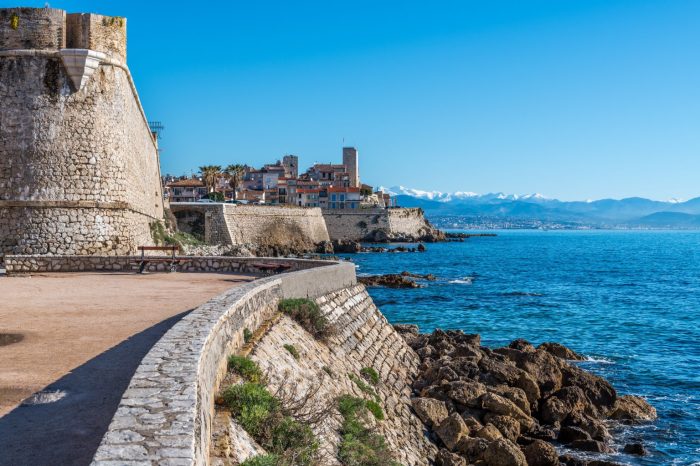
Antibes, a captivating coastal town in the French Riviera, boasts a rich and storied past that spans over two millennia. Its strategic location and natural harbor have played a pivotal role in shaping its destiny, making it a witness to the rise and fall of civilizations.
Founding and Development
The origins of Antibes can be traced back to the 4th century BC when the Greeks established a trading post called Antipolis, meaning “opposite Nice.” Over time, Antipolis grew into a thriving port and commercial center. In the 1st century BC, the Romans conquered the region and renamed the settlement Antibes. Under Roman rule, the town prospered as a strategic military outpost, guarding the entrance to the Gulf of Juan.
Influence of Different Civilizations
Throughout its history, Antibes has been influenced by a diverse array of civilizations. After the fall of the Roman Empire, it came under the control of the Visigoths, then the Saracens, and later the Franks. Each of these cultures left its mark on Antibes, contributing to its architectural, cultural, and linguistic heritage.
Strategic Importance
Antibes’ strategic location has always been a double-edged sword. While it provided opportunities for trade and prosperity, it also made the town a target for invasion. Over the centuries, Antibes has been besieged by numerous armies, including the Spanish, the Austrians, and the English. Each siege left its scars on the town, but it also strengthened its fortifications and resolve.
Modern Era
In the 19th century, Antibes became a popular destination for artists and writers, drawn to its picturesque scenery and vibrant cultural scene. Today, Antibes is a thriving tourist destination, renowned for its beautiful beaches, historic landmarks, and charming atmosphere.
Cultural Heritage of Antibes
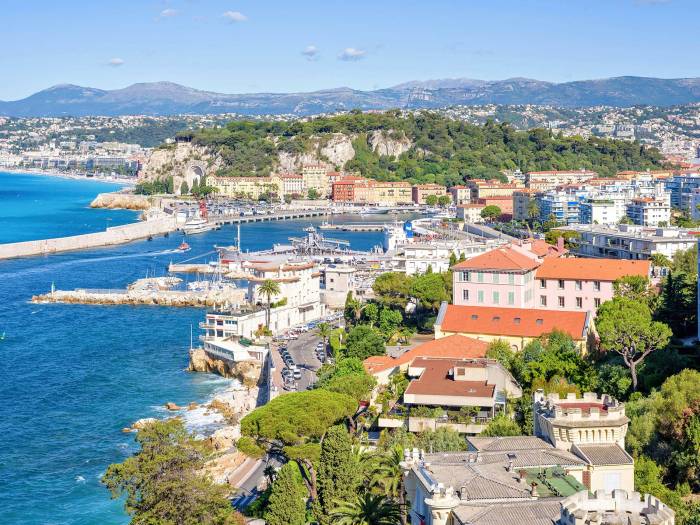
Antibes boasts a rich artistic and cultural legacy that has flourished over centuries. The city has been a haven for artists, writers, and musicians, leaving an enduring imprint on its cultural landscape.
The picturesque town of Antibes on the French Riviera is not only known for its stunning beaches but also for its vibrant cultural scene. From the captivating best cultural festivals worldwide to the charming local traditions, Antibes offers a rich tapestry of experiences that immerse visitors in the region’s unique heritage and creativity.
Notable Artists and Writers, Antibes
- Claude Monet: The renowned Impressionist painter captured the picturesque landscapes of Antibes in his vibrant works.
- Francis Picabia: This avant-garde artist resided in Antibes, contributing to the city’s vibrant art scene.
- Graham Greene: The acclaimed British novelist spent time in Antibes, finding inspiration for his literary works.
Museums and Cultural Institutions
Antibes is home to several museums and cultural institutions that showcase its artistic heritage:
- Musée Picasso: This museum houses an extensive collection of works by the renowned artist Pablo Picasso.
- Musée Peynet et du Dessin Humoristique: Dedicated to the cartoonist Raymond Peynet, this museum exhibits his iconic “Lovers” drawings.
- Théâtre Antibéa: This theater hosts a diverse program of performances, including plays, concerts, and exhibitions.
Geography and Climate of Antibes
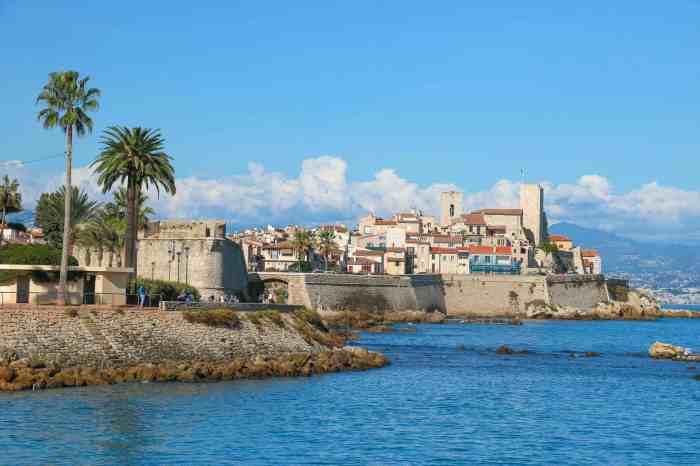
Antibes is a coastal city in southeastern France, situated on the French Riviera between Nice and Cannes. It is located on the Cap d’Antibes, a peninsula that juts out into the Mediterranean Sea. The city is surrounded by hills and mountains, which provide a dramatic backdrop to its beautiful beaches and turquoise waters.
Antibes is a stunning coastal town on the French Riviera, renowned for its picturesque beaches and vibrant atmosphere. If you’re seeking a sustainable vacation experience, consider staying at one of the charming eco-lodges nestled amidst the lush surroundings of Antibes.
These eco-conscious accommodations offer a unique blend of comfort and environmental responsibility, making your stay in Antibes both enjoyable and eco-friendly.
Climate
Antibes enjoys a Mediterranean climate, with hot, dry summers and mild, wet winters. Average temperatures range from 13°C (55°F) in January to 26°C (79°F) in July. Rainfall is moderate, with an average of 600 mm (24 inches) per year. The city receives an average of 2,800 hours of sunshine per year, making it one of the sunniest places in France.
Unique Environment
The geography and climate of Antibes combine to create a unique environment that is perfect for outdoor activities. The city’s beaches are some of the most beautiful in the world, and the surrounding hills and mountains offer opportunities for hiking, biking, and other outdoor pursuits. The mild climate makes it possible to enjoy these activities year-round.
Tourism and Attractions in Antibes
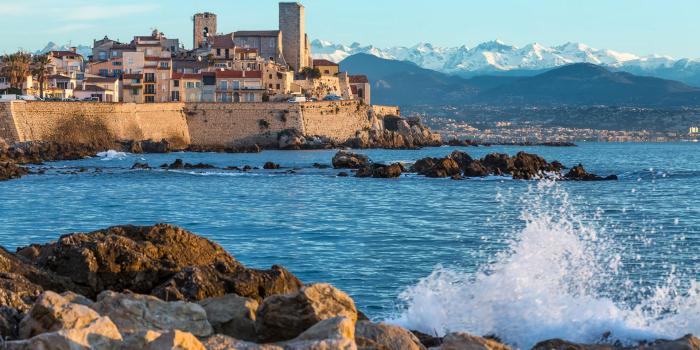
Antibes is a captivating destination on the French Riviera, boasting a rich history, stunning natural beauty, and a vibrant cultural scene. Its captivating allure attracts tourists from around the globe, offering an array of attractions and experiences.
From exploring ancient fortifications to basking on pristine beaches, there’s something for every traveler in Antibes. Let’s delve into the diverse attractions that await your discovery:
Historical Sites
- Fort Carré: A 16th-century star-shaped fortress, Fort Carré stands as a testament to Antibes’ strategic military significance. Its imposing walls and panoramic views make it a must-visit for history buffs.
- Antibes Cathedral: This 12th-century Romanesque cathedral is a striking example of medieval architecture. Its interior boasts intricate frescoes and a serene atmosphere.
- Old Town: Wander through the charming cobblestone streets of the Old Town, where you’ll discover quaint shops, art galleries, and historical buildings that evoke Antibes’ rich past.
Beaches
- Juan-les-Pins: This renowned beach is known for its fine white sand, crystal-clear waters, and lively atmosphere. It’s a perfect spot for swimming, sunbathing, and enjoying water sports.
- Plage de la Gravette: A smaller, more secluded beach, Plage de la Gravette offers a peaceful retreat. Its picturesque setting and calm waters make it ideal for relaxation and enjoying the beauty of the Mediterranean.
- Cap d’Antibes: This scenic peninsula is home to several secluded coves and pristine beaches. It’s a haven for nature lovers and those seeking tranquility.
Cultural Landmarks
- Musée Picasso: Housed in the Château Grimaldi, the Musée Picasso showcases a collection of the renowned artist’s works, including paintings, ceramics, and sculptures.
- Musée d’Archéologie: This museum exhibits artifacts from Antibes’ rich history, providing insights into the city’s past from prehistoric times to the Roman era.
- Jardin Thuret: A botanical garden established in 1857, Jardin Thuret boasts a diverse collection of exotic plants and a serene atmosphere.
Popular Activities and Experiences
Beyond its attractions, Antibes offers a range of activities and experiences for visitors:
- Water sports: Enjoy swimming, snorkeling, diving, and sailing in the clear waters of the Mediterranean.
- Hiking and biking: Explore the scenic trails and bike paths that wind through the Cap d’Antibes and the surrounding countryside.
- Shopping: Discover unique souvenirs, local products, and designer boutiques in the Old Town and Juan-les-Pins.
- Dining: Savor the flavors of Provençal cuisine at charming restaurants and cafés throughout the city.
Infrastructure and Amenities
Antibes boasts a well-developed infrastructure to cater to tourists:
- Accommodation: A wide range of hotels, guesthouses, and vacation rentals are available to suit all budgets.
- Transportation: The city is easily accessible by train, bus, or car. A local bus network provides convenient transportation within Antibes.
- Dining and shopping: Numerous restaurants, cafés, and shops are located throughout the city, offering a variety of options for dining and shopping.
- Tourist information: The Antibes Tourist Office provides comprehensive information on attractions, activities, and services for visitors.
Economy and Industries in Antibes
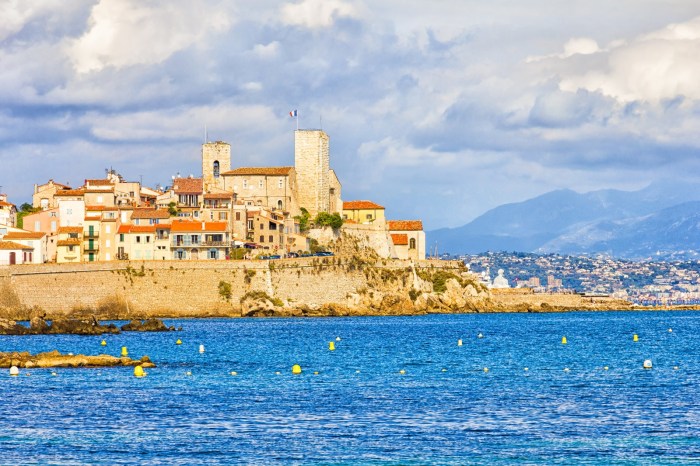
Antibes’ economy is characterized by a diverse range of industries and economic activities. Tourism plays a pivotal role, contributing significantly to the city’s economic prosperity.
The city’s vibrant tourism sector caters to a large number of visitors throughout the year. Antibes boasts a rich cultural heritage, stunning beaches, and a picturesque old town, attracting tourists from around the globe. The tourism industry supports a wide range of businesses, including hotels, restaurants, tour operators, and souvenir shops.
Major Employers and Businesses
In addition to tourism, Antibes is home to several major employers and businesses. The city’s largest employer is the Thales Group, a global aerospace and defense company with a significant presence in Antibes.
Other major employers in Antibes include:
- Sagem Défense Sécurité
- CNIM
- EADS
- Thales Avionics
These companies contribute significantly to the city’s economic growth and provide employment opportunities for its residents.
Lifestyle and Community in Antibes
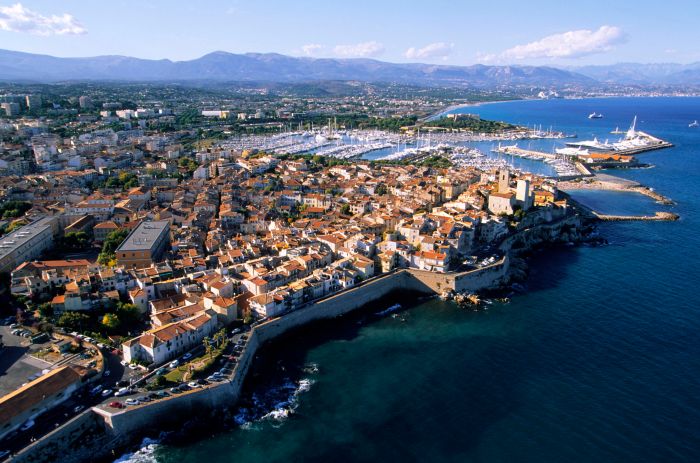
Antibes is a vibrant and welcoming city with a rich cultural heritage and a strong sense of community. The people of Antibes are known for their friendly and laid-back nature, and they enjoy a relaxed and comfortable lifestyle.
The city has a diverse population, with people from all over the world calling Antibes home. This diversity is reflected in the city’s culture, which is a blend of French, Italian, and Provençal influences. Antibes is also home to a large student population, which contributes to the city’s youthful and energetic atmosphere.
Demographics
As of 2023, Antibes has a population of approximately 75,000 people. The city is home to a diverse population, with people from all over the world calling Antibes home. The largest ethnic groups in Antibes are French, Italian, and North African.
Education
Antibes has a strong commitment to education. The city is home to several public and private schools, as well as a university. The University of Nice Sophia Antipolis has a campus in Antibes, which offers a variety of undergraduate and graduate programs.
Healthcare
Antibes has a comprehensive healthcare system. The city is home to several hospitals and clinics, as well as a number of pharmacies. The healthcare system in Antibes is modern and efficient, and it provides high-quality care to the city’s residents.
Sense of Community
Antibes has a strong sense of community. The people of Antibes are proud of their city, and they are always willing to help each other out. The city is home to a number of community organizations and clubs, which provide opportunities for people to get involved and make new friends.
Transportation and Accessibility in Antibes
Antibes offers a well-developed transportation network, catering to both residents and tourists alike. The city’s accessibility by air, rail, and road, coupled with efficient public transportation options, makes it easily accessible and well-connected.
Within the city, the public transportation system is comprehensive and convenient. Buses and trams connect different parts of Antibes, ensuring seamless travel for commuters and visitors. Taxis are also readily available, providing a comfortable and direct mode of transport.
Accessibility by Air
Antibes is conveniently accessible by air through the nearby Nice Côte d’Azur Airport (NCE). The airport is located just 13 kilometers (8 miles) from Antibes and offers numerous domestic and international connections. From the airport, travelers can easily reach Antibes by bus, taxi, or car rental.
Accessibility by Rail
Antibes is well-connected to the French rail network, with the Antibes train station serving as a major hub. The station offers frequent train services to major cities in France, including Paris, Lyon, and Marseille. Additionally, regional trains connect Antibes to nearby towns and villages along the French Riviera.
Accessibility by Road
Antibes is easily accessible by road, with the A8 autoroute (motorway) passing through the city. This motorway provides direct connections to major cities in France and neighboring countries. Additionally, a network of national and departmental roads connects Antibes to surrounding towns and villages.
The picturesque coastal town of Antibes is renowned for its stunning beaches and vibrant atmosphere. If you’re seeking a unique and eco-conscious accommodation experience, consider exploring the array of eco-lodges nestled within the region. These eco-friendly accommodations offer a harmonious blend of comfort and sustainability, allowing you to immerse yourself in the natural beauty of Antibes while minimizing your environmental footprint.
Connectivity and Infrastructure
Antibes’s transportation system is well-integrated and efficient. The city’s public transportation network is synchronized with rail and road services, ensuring smooth transfers for commuters. Additionally, the city’s infrastructure, including roads, bridges, and tunnels, is well-maintained, facilitating seamless transportation.
Real Estate and Property in Antibes
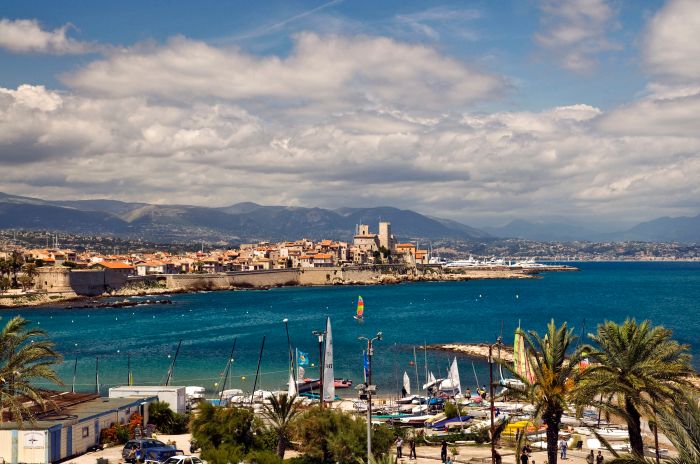
Antibes, with its captivating coastal charm and idyllic setting on the French Riviera, boasts a vibrant real estate market that caters to discerning buyers seeking luxury and exclusivity. Properties in Antibes range from opulent villas perched on the hillsides to elegant apartments overlooking the turquoise waters of the Mediterranean.
Property Types and Prices
The real estate market in Antibes is characterized by a diverse range of property types, including:
– Villas: Luxurious and spacious villas with private gardens, swimming pools, and breathtaking views of the sea and surrounding landscape. Prices for villas start from around €2 million and can exceed €10 million for exceptional properties.
– Apartments: Antibes offers a selection of upscale apartments, both in modern and historic buildings. Prices for apartments typically range from €500,000 to €2 million, depending on the size, location, and amenities.
– Townhouses: Charming townhouses with private entrances and courtyards are also available in Antibes. Prices for townhouses generally fall between €1 million and €2.5 million.
Factors Influencing Property Values
Several factors influence property values in Antibes, including:
– Location: Properties located near the waterfront or with panoramic sea views command a premium.
– Size and amenities: Larger properties with luxurious amenities, such as swimming pools, private gardens, and terraces, are more expensive.
– Condition: The condition of the property, including renovations and upgrades, plays a significant role in determining its value.
– Historical significance: Properties with historical or architectural significance may fetch higher prices.
Buying and Selling Property
The process of buying and selling property in Antibes typically involves the following steps:
– Finding a real estate agent: Engaging the services of a reputable real estate agent is essential for navigating the local market and finding suitable properties.
– Searching for properties: Agents can assist buyers in identifying properties that meet their specific requirements and budget.
– Making an offer: Once a suitable property is found, the buyer submits an offer through their agent.
– Negotiation: The seller and buyer negotiate the terms of the sale, including the price, closing date, and any contingencies.
– Signing the sales contract: A sales contract is drawn up and signed by both parties, outlining the terms of the sale.
– Closing: The closing process involves the transfer of ownership and the payment of the purchase price.
Notable People and Personalities from Antibes
Antibes has been home to many notable people and personalities throughout its history. These individuals have made significant contributions to various fields, including art, literature, music, and politics.
Arts and Culture
- Claude Monet (1840-1926): Impressionist painter who spent time in Antibes and painted several works depicting the town and its surroundings.
- Francis Picabia (1879-1953): Dadaist and Surrealist painter who lived in Antibes for a period and created some of his most famous works there.
- Jacques Prévert (1900-1977): Poet and screenwriter who lived in Antibes and is known for his whimsical and often humorous poems.
Music
- Francis Poulenc (1899-1963): Composer who lived in Antibes and wrote several works inspired by the town, including his opera “Dialogues des Carmélites”.
- Henri Dutilleux (1916-2013): Composer who lived in Antibes and is known for his evocative and atmospheric orchestral works.
Politics
- Pierrefeu (1868-1950): Naval historian and politician who served as mayor of Antibes from 1919 to 1925.
- Charles Ginésy (1945-present): Politician who has served as mayor of Antibes since 1995.
Comparisons with Similar Destinations
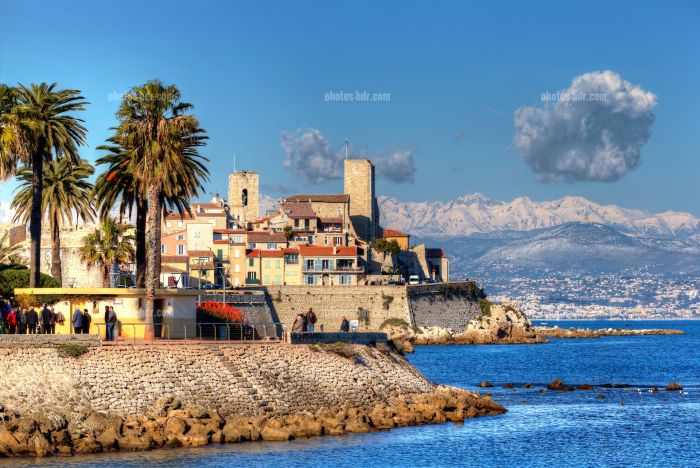
Antibes stands out among other destinations in the region and around the world due to its unique blend of history, culture, attractions, and lifestyle. While it shares similarities with other destinations, it also possesses distinctive features that set it apart.
In terms of history, Antibes shares a rich past with many coastal cities in the Mediterranean. Like Nice and Cannes, it has been influenced by various civilizations, including the Greeks, Romans, and Italians. However, Antibes’s unique position as a fortified town and its strategic location have shaped its history differently, resulting in a distinct cultural heritage.
Culture and Attractions
Antibes boasts a vibrant cultural scene comparable to that of other cultural hubs in the region. It hosts numerous art exhibitions, music festivals, and cultural events throughout the year. However, Antibes’s cultural identity is particularly influenced by its maritime heritage and its proximity to the sea. This is reflected in its museums, such as the Musée Picasso and the Musée d’Archéologie, which showcase artifacts and artworks related to the city’s maritime past.
Lifestyle and Ambiance
Antibes offers a relaxed and sophisticated lifestyle similar to other coastal destinations in the French Riviera. It boasts a charming old town with cobblestone streets, quaint boutiques, and lively cafés. However, Antibes’s unique character is defined by its relaxed atmosphere and its strong sense of community. The city’s residents and visitors enjoy a laid-back pace of life, taking advantage of the beautiful beaches, picturesque harbor, and lush parks.
Unique Features and Advantages
Antibes distinguishes itself from other destinations through its exceptional features and advantages. Firstly, its strategic location on the Côte d’Azur provides easy access to major cities like Nice and Cannes, as well as to neighboring Italy. Secondly, Antibes offers a diverse range of attractions, including historical sites, art museums, and beautiful beaches, all within a compact and walkable area.
Furthermore, Antibes benefits from a mild Mediterranean climate, making it an ideal destination year-round. Its stunning natural beauty, with its turquoise waters and verdant surroundings, further enhances its appeal. Finally, Antibes’s strong commitment to sustainability and environmental protection sets it apart as a responsible and forward-thinking destination.
Last Point
As you bid farewell to Antibes, its allure lingers in your heart, a testament to the enduring charm of this captivating destination. Its rich tapestry of history, culture, and natural beauty has woven a spell that will forever evoke fond memories. From the ancient ramparts to the vibrant streets, from the sun-kissed beaches to the enchanting museums, Antibes has etched itself into your soul as a place of wonder and inspiration. May your future journeys be filled with experiences as extraordinary as those you have encountered here.
FAQ Summary
What is the best time to visit Antibes?
Spring and fall offer the most pleasant weather, with warm temperatures and fewer crowds.
What are the must-see attractions in Antibes?
The Musée Picasso, Fort Carré, the Vieil Antibes (Old Town), and the Cap d’Antibes are among the top attractions.
Is Antibes a good place for families?
Yes, Antibes has several family-friendly beaches, parks, and attractions, such as Marineland.
What is the local cuisine like in Antibes?
Antibes offers a delectable blend of Provençal and Mediterranean flavors, with fresh seafood, local produce, and aromatic herbs.